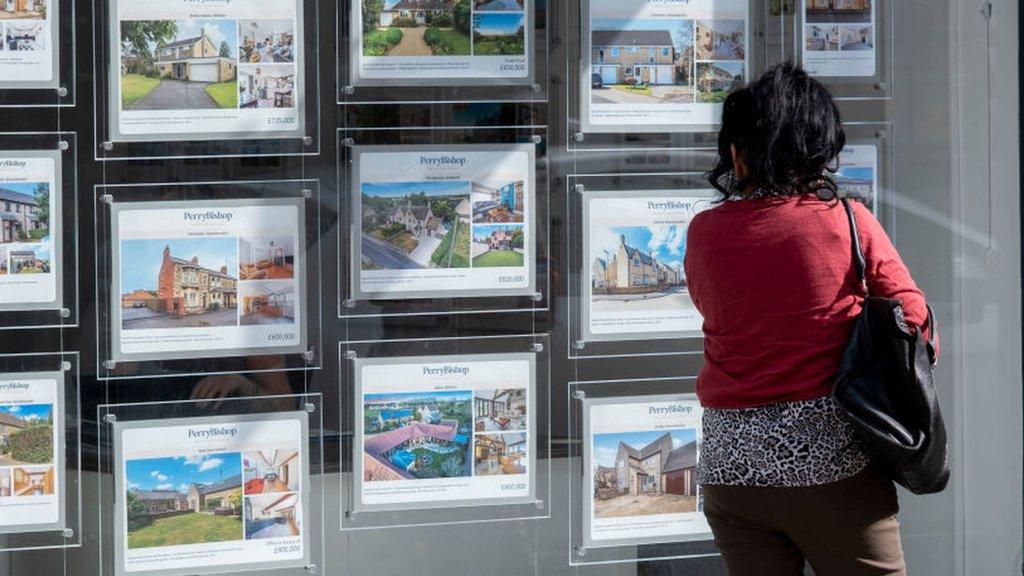Lower cost of tea eases January price rises
- Published
- comments

Slowing prices for tea helped ease inflation in January
Shop prices rose at their slowest rate in more than 18 months in January, according to the latest report from the British Retail Consortium (BRC).
Inflation - the rate at which prices rise - has reached near-record highs in recent times, prompting a cost-of-living crisis.
However, discounts and lower prices for milk and tea saw shop price inflation fall to 2.9%, from 4% in December.
Overall, prices are still going up in the shops but at a slower rate.
On average, food prices are still rising by more than 6% a year.
The BRC, which represents some of the UK's biggest retailers, said shop price inflation in January was at its lowest level since May 2022.
Discounts after New Year also helped to slow down the rate of price increases for non-food products, which eased to 1.3%, down from 3.1% the month before.
However, the BRC warned in its report that many households had not felt the benefit of lower inflation, adding there were risks that price rises could accelerate once more.
Helen Dickinson, chief executive of the BRC, said progress in slowing price rises was likely to be hampered by other cost pressures, including implementing the increase in the National Living Wage, and an increase in business rates in April.
"Rising geopolitical tensions will also add to uncertainty and costs in supply chains. With a general election later this year, we want to see political parties outline how they will help unlock investment across the country, rather than the current trajectory, which is doing just the opposite," Ms Dickinson said.
Dry January
Separate data from research company Kantar said food price inflation fell at a slower rate in January due to fewer people buying promotional items compared with December.
It said some 86 million more lunchboxes were taken to work or school in 2023 as people sought to manage budgets more closely.
"As consumers across the country took on Dry January, spending on alcohol fell by more than half compared with December, said Fraser McKevitt, head of retail and consumer insight at Kantar.
Almost 6% of beer packs sold in January were no or low-alcohol options, marking a jump from 4% at the end of last year. Sales of own-label plant-based ranges increased by 8% on the month as Veganuary got under way, Kantar said.
Some analysts fear inflation will stay elevated, following attacks on ships using a vital trade route through the Red Sea.
Several shipping firms have stopped vessels using the route after the attacks by Houthi rebels in Yemen. Last week, the US and UK launched military strikes against the Houthis.
But Mr McKevitt said: "There's been a lot of speculation about the impact the Red Sea shipping crisis might have on the cost of goods, but the story in the grocery aisles this January is more about the battle between the supermarkets to offer best value, rather than geopolitics.
"Retailers have taken their foot off the promotions gas slightly as we've come into the New Year, and that's meant inflation hasn't fallen as quickly."
He added attention would now turn to Valentine's Day to see if couples opt for more low-key celebrations again, like they did in 2023.
However, although tobacco and alcohol prices remain high, there is some hope that headline inflation could fall to nearer the Bank of England's 2% target as energy bills are predicted to come down in 2024.
The predicted fall in the inflation rate has fuelled hopes that the Bank will cut its key interest rate, which currently stands at a 15-year high.
The Bank has increased interest rates 14 times since December 2021 in an attempt to tackle inflation, which has strained the finances of UK households over the past two years.

Are you finding it easier to purchase things like milk and tea? Please share your experiences by emailing haveyoursay@bbc.co.uk, external.
Please include a contact number if you are willing to speak to a BBC journalist. You can also get in touch in the following ways:
WhatsApp: +44 7756 165803
Tweet: @BBC_HaveYourSay, external
Please read our terms & conditions and privacy policy
If you are reading this page and can't see the form you will need to visit the mobile version of the BBC website to submit your question or comment or you can email us at HaveYourSay@bbc.co.uk, external. Please include your name, age and location with any submission.
- Published17 January 2024

- Published15 January 2024
